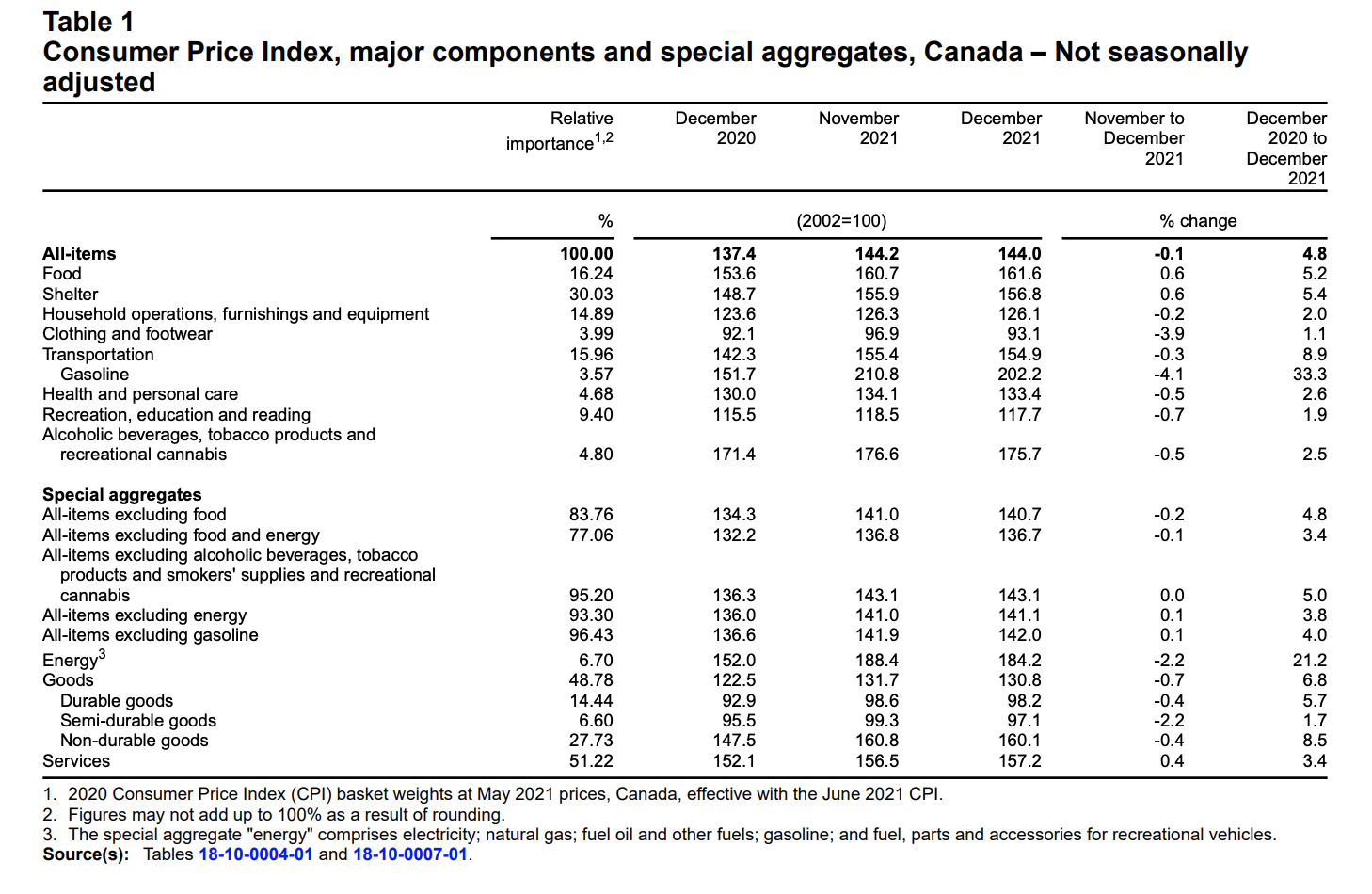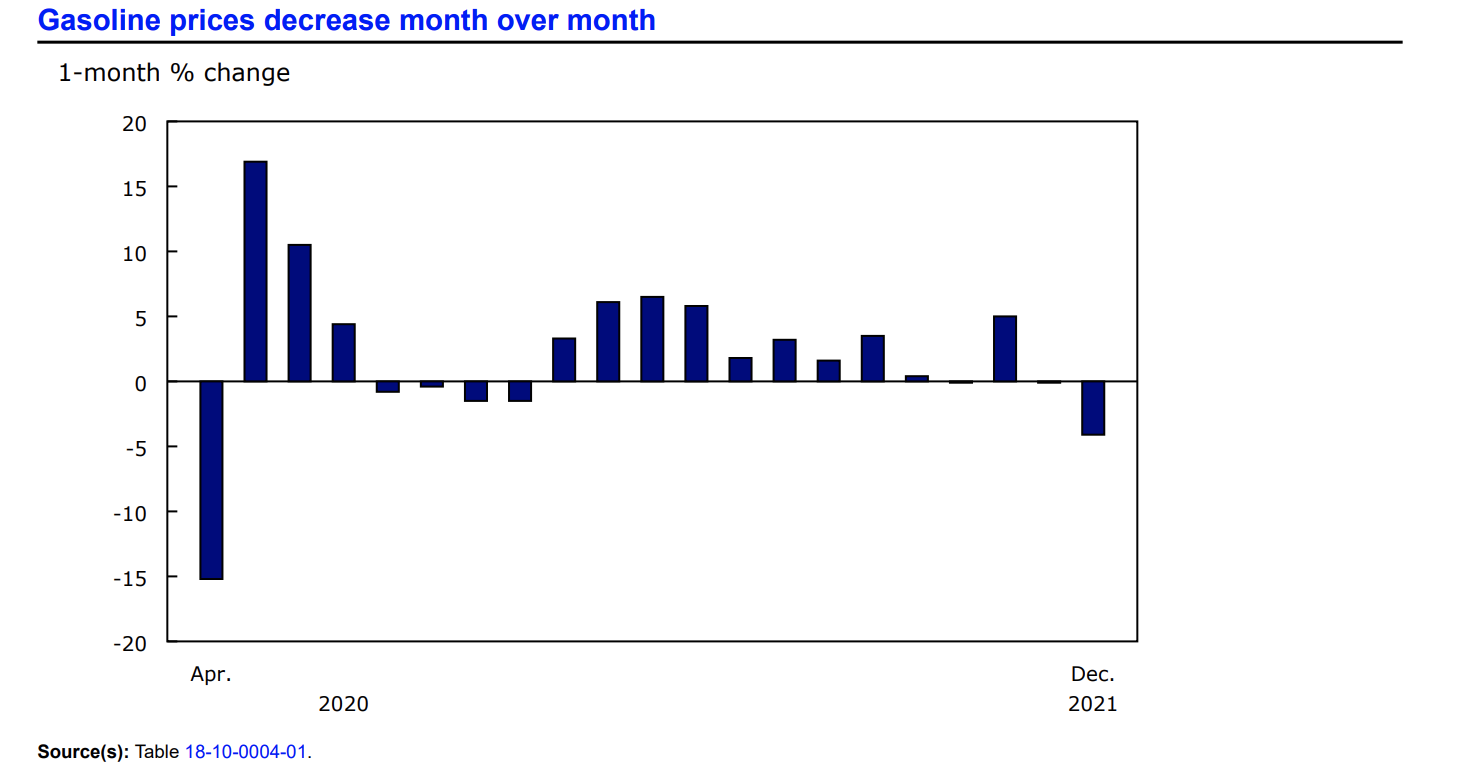The Consumer Price Index (CPI) dropped 0.1% in December on a monthly basis, reported Statistics Canada. The agency stated that this “was the first monthly decline since December 2020, as gasoline prices fell in response to lower demand amid the spread of the Omicron COVID-19 variant”.
On a year-over-year basis, the Consumer Price Index (CPI) increased 4.8%, compared to the 4.7% increase seen in November. Excluding the price of gas, the CPI rose 4% in the last 12-month period.
“Canadians continued to feel the impact of rising prices for groceries in December, as unfavourable weather conditions during the growing season and supply chain disruptions put upward pressure on prices. Supply chain disruptions also led to higher prices for durable goods, including passenger vehicles and household appliances, while higher construction costs and the increased frequency and severity of weather events contributed to rising home and mortgage insurance costs,” explained Stats Can in its monthly report.
The agency also touched upon inflation in its December report.
“Inflation is often compared with changes to average wages. In December 2021, the CPI rose 4.8% on a year-over-year basis. Wage data, which maintains employment composition by occupation and tenure from the Labour Force Survey, found that wages rose 2.6% during the same period, meaning that, on average, prices rose faster than wages, and Canadians experienced a decline in purchasing power.”

(Sources: Statistics Canada)
Food
In December, Canadians continue to pay more for food as the food index rose 5.7% since this time last year.
“Grocery prices continued to climb in December, rising 5.7% year over year, the largest yearly increase since November 2011. Prices for fresh fruit (+5.6%), including apples (+6.7%), oranges (+6.6%), and bananas (+2.5%), increased on a year-over-year basis. Unfavourable weather conditions in growing regions, as well as supply chain disruptions, led to higher prices for households. In addition, prices for bakery products rose 4.7% year over year, as drought during the summer months reduced wheat crop yields, in turn raising prices for shoppers,” stated the agency.

(Sources: Statistics Canada)
Gasoline
Over the last 12-month span, the price of gasoline edged up slightly less in December to 33.3%, compared to 43.6% seen in November.
“On a monthly basis, Canadian drivers paid less at the pumps as gasoline prices fell 4.1%, the largest monthly decline since April 2020. The tightening of public health restrictions in response to the new Omicron variant weighed on demand for gasoline,” said Statistics Canada.
Statistics Canada released a statement along with its monthly report regarding COVID-19 and the Consumer Price Index
“In December 2021, no special treatments for goods and services due to the COVID-19 pandemic were required. However, Statistics Canada continues to monitor the impacts of the new Omicron variant on the Consumer Price Index (CPI). The details of the special treatments from April 2020 to March 2021 are provided in technical supplements available through the Prices Analytical Series. Details and other treatment information for April 2021 and onwards are available upon request. The CPI is continuously evolving to incorporate the most timely and accurate data sources and methods. In the coming months, new sources of administrative data will be introduced for the mortgage interest cost index and the cellular services price index. Work is also underway to include the price of used cars and trucks, and users will be informed in advance of this change.”
Source cited: https://www150.statcan.gc.ca/n1/daily-quotidien/220119/dq220119a-eng.htm


